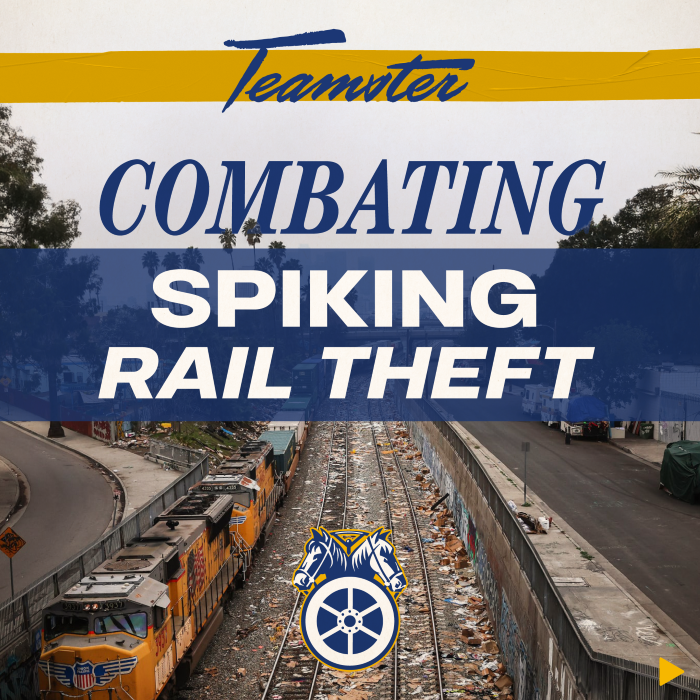
In the desert between Arizona and California, a two-person Teamster crew –– a locomotive engineer and a conductor –– controls a three-mile-long freight train that’s transporting millions of dollars of merchandise. On flat ground, the train moves 70 miles an hour. But climbing to higher elevations, it has to slow down considerably because of its massive size.
Groups of bandits have scouted out stretches like these as staging grounds for elaborate heists. Running alongside the boxcars, they leap onto the moving train. As some make their way to containers with valuable products, others use power tools to cut an air hose that controls the brakes, bringing the train to a screeching halt –– a life-threatening maneuver which can cause derailment. All the while a truck of thieves follows close behind, waiting to load up the stolen goods.
At the time, all of this is unknown to the Teamsters locomotive engineer and conductor. They’ve heard stories from others in the industry about heists in the barren desert, but they can’t be certain of what’s happening until they personally identify what caused the train to stop.
To do that, they have to split up, potentially exposing both of them to armed robbers, so the conductor can make the lonely walk along the full length of the train and figure out why the air hose stopped working. This can take up to 45 minutes –– putting the conductor at extreme risk and giving crafty criminals plenty of time to make off with their loot.
This might sound like something out of an old John Wayne western movie, but for Teamsters railroaders, it’s an ever-present threat to themselves and their livelihoods.
“Precision Scheduled Railroading” Putting Teamsters at Risk
Train heists have spiked in recent years, with more than 65,000 thefts on America’s railroads in 2024 alone. That’s an increase of 40 percent compared to the year before. This rise in crime has been driven in part by Wall Street’s obsession with “precision scheduled railroading” (PSR), which is pushing carriers to cut corners at the expense of their crews’ safety. And the problem is only getting worse.
PSR refers to a single-minded, short-sighted pursuit of profit that blinds companies to their vulnerabilities and responsibilities. Guided by this philosophy, carriers do anything and everything possible to juice their short-term margins. A big part of that strategy is recklessly trying to eliminate labor costs, even when it endangers workers’ lives.
There are two big ways the railroads have done this that are leading to heists. First, they are making trains longer than what can be safely operated so they can employ fewer engineers and conductors per line.
The Teamsters Rail Conference has long put a spotlight on the dangers posed by excessively long trains –– not just to workers but to entire communities. Not only do they make Teamsters railroaders targets for train robbers, but they also lead to blocked crossings that can disrupt traffic and impede first responders from doing their jobs.
“Carriers are making their trains several miles long now,” said Eddie Hall, who recently retired as President of the Brotherhood of Locomotive Engineers and Trainmen (BLET) –– which, along with the Brotherhood of Maintenance of Way Employes Division, makes up the Teamsters Rail Conference. “This relentless push for longer trains is putting our members at risk and giving thieves more opportunities to commit crimes.”
And second, carriers are slashing the sizes of their police forces, making these long trains easier targets for bandits. Railroads are unique in our economy in that they employ their own law enforcement officials to protect workers and merchandise on their territories. Thanks to PSR, though, carriers have been refusing to employ the number of officers that would be needed to maintain law and order on their lines and keep crews safe.
The Teamsters Rail Conference is pushing back against both these trends. We are continually calling on carriers to keep trains at a safe length and to hire an adequate number of law enforcement officials. We are promoting legislative solutions to ensure safety on our nation’s railroads. And we are making sure the voices of the union hall are heard in the chambers of power.
That includes a recent visit by Eddie Strom, a locomotive engineer at Union Pacific Railroad and President of BLET Division 28, to Washington, D.C., where he took part in a Congressional Roundtable on cargo theft. Strom was asked by House Subcommittee on Railroads, Pipelines, and Hazardous Materials Chairman Daniel Webster (R-Fla.) and Ranking Member Dina Titus (D-Nev.) to speak directly with members of Congress about his experiences dealing with crime on the railroads. He works in one of the most heavily targeted parts of the country, and multiple trains he has operated have been robbed by thieves.
“In the first 20 years I worked on the railroad, it was rare to see any sort of theft. But in recent years, I have seen firsthand train robberies, vandalism, and sabotage. And the carriers are turning a blind eye to what’s causing this: PSR,” said Strom. “It’s time for carriers to get back to running safer and more efficient railroads for their employees, customers, and the public.”
The post Heists Endanger Teamsters Railroaders appeared first on International Brotherhood of Teamsters.
